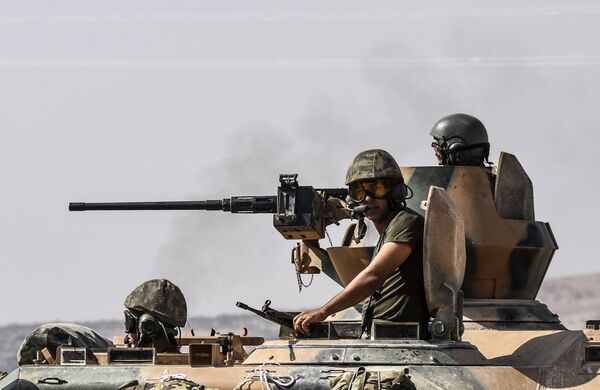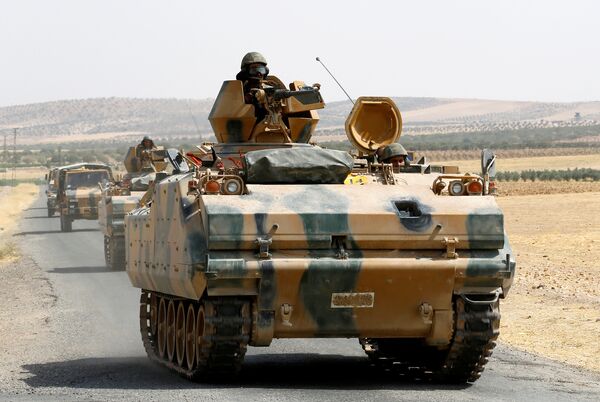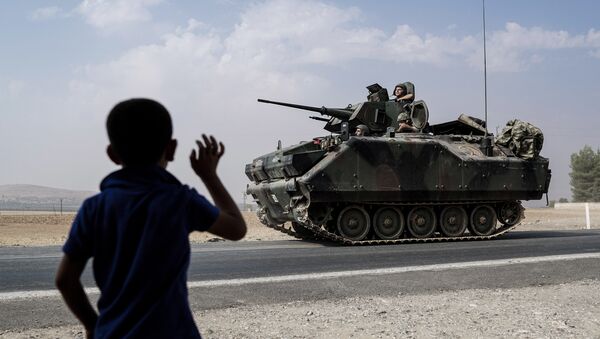“Turkey wants to protect itself from its own Kurdish population, and from being obliged to treat those Kurds with basic dignity,” Henry Kamens, expert on Central Asia and Caucasus, writes in his article for the New Eastern Outlook website.
“It has now been maneuvered into a position where the best way it can achieve this is by helping create a new Kurdish state, as the US has long desired, on terms as favorable to both Turkey and the US as possible,” he further says.
The US strategy, the author suggests, is to “let the Turks occupy territory in Syria which would otherwise have fallen to the US-backed Kurdish People’s Protection Units (YPG), which have until now been the spear point in securing the Turkish-Syrian border areas still under the control of the Islamic State (Daesh).”
“This presents Turkey as the conqueror of the Kurdish terrorists who threaten it,” he explains.
It also means that a “legal” Kurdish state can be established within territory occupied by “legal” powers, rather than a rogue state set up by terrorists, he adds.
The military offensive, which the author calls an “illegal Turkish incursion into a sovereign country, supported by the US,” is designed to kill two birds with one stone.

“As a reward for helping create the new US-sponsored Kurdish state Turkey has been given free rein to go after the Kurds who control the area at present,” he says.
“From the Turkish viewpoint, the Kurds are trying to steal Turkish territory. From the US viewpoint, they are succeeding in driving back Daesh and creating a contiguous Kurdish State on their own terms, not the Kurdish State envisioned by the US.”
The author suggests that now the US “is using the Kurds as a means of getting back at disobedient Turkey.”
He explains that Ankara is concerned that the Turkey-based Kurdistan Workers' Party (PKK) is becoming a real political force, with the backing of Syria and Iraq.
“The Peshmerga gains from Daesh have made this a real possibility, and although the US did not want to see these gains it has turned them to its advantage by using them to draw Turkey into this adventure,” he explains.

Thus the author suggests that by “helping the US to create a Kurdish state controlled by Kurds,” Turkey makes sure that no part of Turkey becomes the territory of this state.
The move serves to repair relations with the US by helping it fulfill its plan and at the same time does not compromise its new friendship with Russia, as it is merely fighting terrorists, not the Syrian government which Russia supports, Henry Kamens suggests.
“It will go after a number of Kurdish targets outside its borders and within and then come out of it as the joint architect of a new Kurdish state, a gift from the benevolent Turkish people, which doesn’t include any of Turkey and ensures Turkish control of the regional oil trade and a pretext for stripping Turkey’s Kurds of their remaining rights,” he says.
The author also notes the “suspect timing” of the offensive.
“It is related to the US elections and gives a boost to the US, the Obama administration and Obama’s preferred successor, Hillary Clinton. But it also gives the Turkish military the green light to do what they have long been waiting with bated breath to do,” he states.
A similar view is echoed by Newsweek magazine, which also draws attention to the recent visit of Vice President Biden to Ankara where he met with Recep Tayyip Erdogan on August 23.
“Perhaps the tide is now turning in Washington, following the Erdogan-Putin meeting (August 9),” it suggests.
“The White House helped prepare Biden’s visit with its response to the August 20 terrorist bombing of a wedding in Gaziantep, noting the US “stands with the Turkish people as they defend their democracy in the face of all forms of terrorism” and dubs Turkey the US’s “valued NATO ally and partner.”
The US must now “build on this momentum” and “find a way to overcome the impasse regarding Mr Gulen’s extradition,” otherwise Ankara will “freefall into Putin’s arms.”
Though this will not be easy, it will be worth the effort, since Turkey is more valuable within NATO than outside it.



